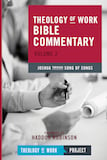Rebuilding the Temple (Ezra 1:1-6:22)
Bible Commentary / Produced by TOW Project
The Book of Ezra begins with a decree from King Cyrus of Persia, allowing the Jews to return to Jerusalem to rebuild the temple that had been destroyed by the Babylonians in 587 BC (Ezra 1:2-4). The introduction to this decree specifies when it was proclaimed: “In the first year of King Cyrus” (539-538 BC, shortly after the Persian defeat of Babylon). It also introduces us to one of the principal themes of Ezra-Nehemiah: the relationship between God’s work and human work. Cyrus made his proclamation “that the word of the Lord by the mouth of Jeremiah might be accomplished,” and because “the Lord stirred up the spirit of King Cyrus” (Ezra 1:1). Cyrus was doing his work as king, seeking his personal and institutional ends. Yet this was a result of God’s work within him, advancing God’s own purposes. We sense in the first verse of Ezra that God is in control, yet choosing to work through human beings, even Gentile kings, to accomplish his will.
Workplace Christians today also live in trust that God is active through the decisions and actions of non-Christian people and institutions. Cyrus was God’s chosen instrument, whether or not Cyrus himself recognized that. Similarly, the actions of our boss, co-workers, customers and suppliers, rivals, regulators or a myriad of other actors may be furthering the work of God’s kingdom unrecognized by either us or them. That should prevent us from both despair and arrogance. If Christian people and values seem absent from your workplace, don’t despair — God is still at work. On the other hand, if you are tempted to see yourself or your organization as a paragon of Christian virtue, beware! God may be accomplishing more through those with less visible connection to him than you realize. Certainly, God’s work through Cyrus — who remained wealthy, powerful, and unbelieving, even while many of God’s people were only slowly recovering from the poverty of exile — should warn us not to expect wealth and power as a necessary reward for our faithful work. God is using all things to work towards his kingdom, not necessarily towards our personal success.
God’s work continued as many Jews took advantage of Cyrus’ decree. “Every one whose spirit God had stirred” prepared to return to Jerusalem (Ezra 1:5). When they arrived in Jerusalem, their first job was to build the altar and offer sacrifices on it (Ezra 3:1-3). This epitomizes the chief sort of work chronicled in Ezra and Nehemiah. It is closely associated with the sacrificial practices of Old Testament Judaism, which took place in the temple. The work described in these books reflects and supports the centrality of the temple and its offerings in the life of God’s people. Worship and work stride hand and hand through the pages of Ezra and Nehemiah.
Given the focus in Ezra upon the rebuilding of the temple, people’s jobs are mentioned when they are relevant to this effort. Thus the list of people returning to Jerusalem specifically itemizes “the priests, the Levites… and the singers, the gatekeepers, and the temple servants” (Ezra 2:70). The text identifies “masons and carpenters” because they were necessary for the building project (Ezra 3:7). People whose skills did not equip them for working directly on the temple contributed to the task through the fruit of their work in the form of “freewill offerings” (Ezra 2:68). Thus, in a sense, the rebuilding of the temple was the work of all the people as they contributed in one way or another.
Ezra identifies political leaders in addition to Cyrus because of their impact, positive or negative, on the construction effort. For example, Zerubbabel is mentioned as a leader of the people. He was the governor of the territory who oversaw the rebuilding of the temple (Haggai 1:1). Ezra mentions “Rehum the royal deputy and Shimshai the scribe,” officials who wrote a letter opposing the temple’s reconstruction (Ezra 4:8-10). Other kings and officials show up according to their relevance to the rebuilding project.
The temple is what the project was about, but it would be a mistake to think that God blesses craftsmanship and material work only when it is devoted to a religious purpose. Ezra’s vision was to restore the whole city of Jerusalem (Ezra 4:13), not just the temple. We will discuss this point further when we come to Nehemiah, who actually undertook the work beyond the temple.
Ezra describes several efforts to squelch the construction (Ezra 4:1-23). These were successful for a while, stopping the temple project for about two decades (Ezra 4:24). Finally, God encouraged the Jews through the prophecies of Haggai and Zechariah to resume and complete the job (Ezra 5:1). Moreover, Darius, king of Persia, underwrote the building effort financially in the hope that the Lord might bless him and his sons (Ezra 6:8-10). Thus the temple was finally completed, thanks to the fact that God had “turned the heart of the king of Assyria to them” so that “he aided [the Jews] in the work on the house of God” (Ezra 6:22).
As this verse makes clear, the Jews actually did the work of rebuilding the temple. Yet their labors were successful because of help from two pagan kings, one who inaugurated the project and the other who paid for its completion. Behind these human efforts loomed the overarching work of God, who moved in the hearts of the kings and encouraged his people through the prophets. As we have seen, God is at work far beyond what meets the eye of his people.












